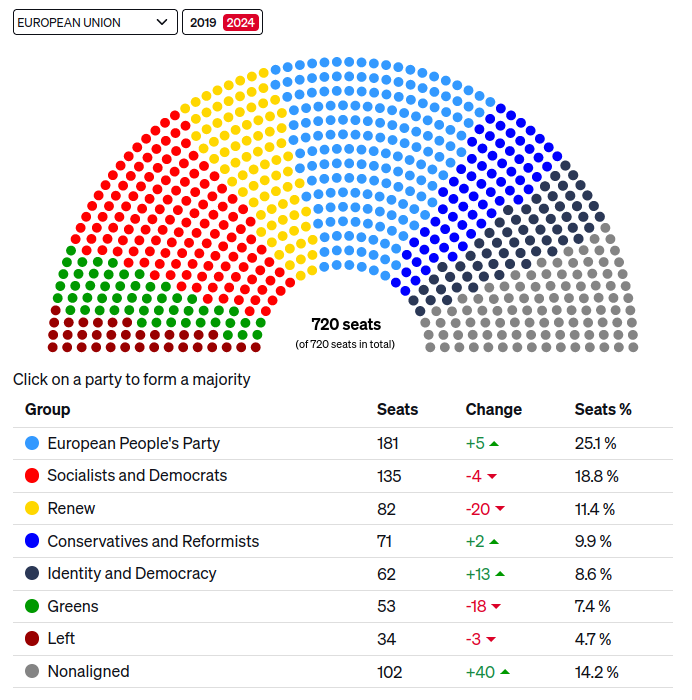this post was submitted on 09 Jun 2024
477 points (99.0% liked)
Europe
8324 readers
1 users here now
News/Interesting Stories/Beautiful Pictures from Europe 🇪🇺
(Current banner: Thunder mountain, Germany, 🇩🇪 ) Feel free to post submissions for banner pictures
Rules
(This list is obviously incomplete, but it will get expanded when necessary)
- Be nice to each other (e.g. No direct insults against each other);
- No racism, antisemitism, dehumanisation of minorities or glorification of National Socialism allowed;
- No posts linking to mis-information funded by foreign states or billionaires.
Also check out [email protected]
founded 2 years ago
MODERATORS
you are viewing a single comment's thread
view the rest of the comments
view the rest of the comments

You're misrepresenting me, I never said anybody had a good heart. People are hypocrites. In theory they are all for the greater good as long as their own personal cost is zero.
And how is that relevant to what I said? What point are you trying to make here? You can also bike to work, many people still prefer to drive.
First, nobody ever planned to mandate that. It's a lie made up by Bild and the FDP. From the very beginning the only thing the heating law was going to mandate was that your heating had to run on 60% (I believe, don't cite me on the exact number) CO2 neutral energy. Heat pumps are just automatically assumed to fulfill this condition, regardless of the current energy mix in Germany. But it was always going to be up to you how you fulfilled this condition.
Second, it IS a good idea. You can instantly lose one entire set of pipes going into your home and you instantly more than halve your carbon emissions even with the current energy mix. Yes it works, yes it also works in a cold winter, and no you don't have to instantly insulate your entire home, renew your roof and all your internal piping. At least not if you don't live in a farm house from the 1930s that never had any work done.
Third:
Which is an option and would have been an option under the original law.
Also, what actual scientist says that, as an absolute, no "ifs", no conditions?
Because the thing is, if your district heating runs on fossils, which most do, it does jack shit to combat carbon emissions and helps exactly zero.
Also, getting hooked up to district heating isn't free either.
It also doesn't help if your city maybe sorta plans to start planning district heating to be eventually implemented some time in the 2090s, but only if we have enough money and the next 20 governments don't change the plan along the way. Emissions need to be reduced now, not some day in the future if we feel like it. Decentralized solutions are faster and can be implemented by individuals without waiting for political decisions that could happen in 10 years or never.
This is an excuse to not have to act, nothing more.
It is not a realistic option because the federation isn't giving municipalities access to the capital needed to invest in that stuff.
No. Decentralised solutions need decentralised work which more often than not is a higher total amount than if there was some kind of centralisation -- also "municipal level" is not exactly the pinnacle of centralisation. With district heating a municipality needs a couple of specialists dealing with the actual heating part, installation workers which can be any plumber, not just specialists, and road workers which are a completely different pool. For a decentralised solution you need a gazillion of specialists, of which there are not enough. You need to order a gazillion of individual heat pumps and guess what companies aren't able to deliver in those numbers. Want to get a heat pump installed today? Call a company, they'll tell you that they'll be able to squeeze you in for an initial assessment in five years.
And this was known. The studies comparing different approaches had been made. Of course they were made this is Germany. And the Greens went ahead and said "we'll take the one that our members feel comfortable with, where they can feel superior to everyone else because they've been ahead of the curve". The biggest obstacle to Green policies in Germany is not the voter, but the insistence of the Green party to smell its own farts.